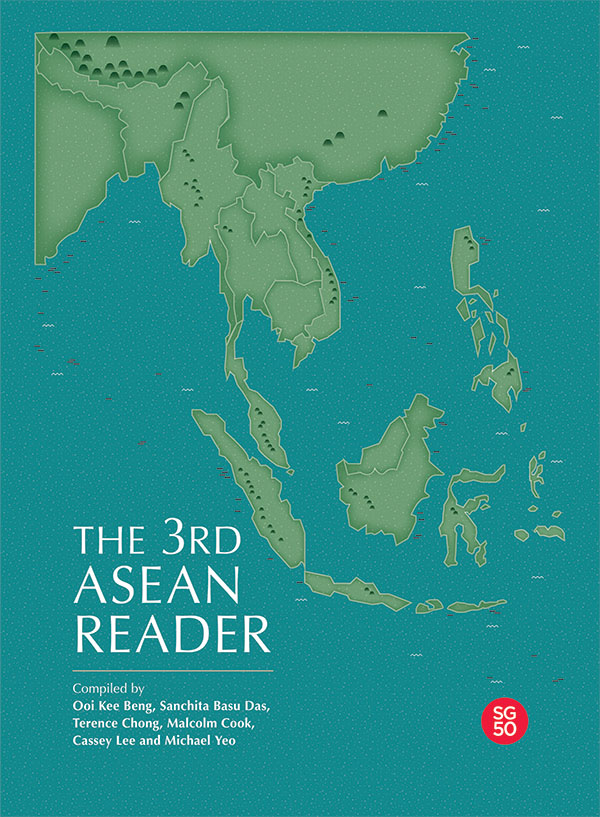Book contents
- Frontmatter
- Contents
- Preface
- Forewords to the First and Second ASEAN Reader: ASEAN: Conception and Evolution
- Forewords to the First and Second ASEAN Reader: ASEAN: The Way Ahead
- Forewords to the First and Second ASEAN Reader: New Challenges for ASEAN
- SECTION I ASEAN: THE LONG VIEW
- SECTION II COUNTRY ANALYSES
- SECTION III COMPARATIVE ANALYSES OF THE REGION
- Southeast Asian Societies
- The Southeast Asian Economy
- Southeast Asian Politics
- SECTION IV INTERNATIONAL DEVELOPMENTS
- SECTION V INSTITUTIONS OF ASEAN
- Section Introduction by
- 32 The Cambodia-Thailand Conflict: A Test for ASEAN
- 33 ASEAN in the Twenty-First Century: A Sceptical Review
- 34 Facing Unfair Criticisms
- 35 Challenges Facing the New ASEAN Secretary-General
- 36 ASEAN Governing Mechanisms
- SECTION VI ASSESSING ASEAN'S INTERNAL POLICIES
- ASEAN Political Security Community
- ASEAN Economic Community
- ASEAN Socio-Cultural Community
- SECTION VII ASSESSING ASEAN'S EXTERNAL INITIATIVES
- ASEAN Processes
- ASEAN's Major Power Relations
- SECTION VIII SOUTHEAST ASIA: PERIPHERAL NO MORE
- Bibliography
- The Contributors
- The Compilers
36 - ASEAN Governing Mechanisms
from SECTION V - INSTITUTIONS OF ASEAN
Published online by Cambridge University Press: 22 June 2017
- Frontmatter
- Contents
- Preface
- Forewords to the First and Second ASEAN Reader: ASEAN: Conception and Evolution
- Forewords to the First and Second ASEAN Reader: ASEAN: The Way Ahead
- Forewords to the First and Second ASEAN Reader: New Challenges for ASEAN
- SECTION I ASEAN: THE LONG VIEW
- SECTION II COUNTRY ANALYSES
- SECTION III COMPARATIVE ANALYSES OF THE REGION
- Southeast Asian Societies
- The Southeast Asian Economy
- Southeast Asian Politics
- SECTION IV INTERNATIONAL DEVELOPMENTS
- SECTION V INSTITUTIONS OF ASEAN
- Section Introduction by
- 32 The Cambodia-Thailand Conflict: A Test for ASEAN
- 33 ASEAN in the Twenty-First Century: A Sceptical Review
- 34 Facing Unfair Criticisms
- 35 Challenges Facing the New ASEAN Secretary-General
- 36 ASEAN Governing Mechanisms
- SECTION VI ASSESSING ASEAN'S INTERNAL POLICIES
- ASEAN Political Security Community
- ASEAN Economic Community
- ASEAN Socio-Cultural Community
- SECTION VII ASSESSING ASEAN'S EXTERNAL INITIATIVES
- ASEAN Processes
- ASEAN's Major Power Relations
- SECTION VIII SOUTHEAST ASIA: PERIPHERAL NO MORE
- Bibliography
- The Contributors
- The Compilers
Summary
Today ASEAN operates in a substantially different environment than the one it faced when it was established in 1967. The world has shrunk and its economy has globalized. ASEAN has also evolved. From a focus on regional security, the group's agenda has gradually expanded to cover many new issues, especially economic. The importance of the economic community is expected to continue growing in relative terms compared with the political-security and socio-cultural communities.
ASEAN's institutional set-up has served the region well so far. Its limitations have, however, become evident as it was designed for a group focused on regional security and handling a limited scope of activities. As ASEAN's mandate and operations have largely expanded over the years, its institutional framework and governing mechanisms need efficiency updates. They have become inadequate in keeping pace with internal and external developments.
DECISION-MAKING SYSTEM
Consensus has been ASEAN's basic principle for decision making. Although a multi-track, multi-speed approach was often used in implementing agreements, decisions are typically made only when agreement is unanimously reached by all member countries. The principle of consensus decision-making is enshrined in the ASEAN Charter (Article 20), which also cites the importance of consultations to inform decisions, deferring to the Leaders’ Summit to resolve cases when consensus cannot be reached.
Consensus has worked well to date, especially in dealing with political and security matters. For economic and social issues, however, it often creates unnecessary rigidities. A qualified majority system can in fact be seen as a better substitute to consensus for non-fundamental, operational decisions as it eliminates inefficiencies when resolutions need to be timely made. This is especially true when matters are of a non-fundamental nature. A qualified majority also avoids the possibility of small minorities holding the entire group hostage when dealing with relatively minor issues. As ASEAN activities become more articulated and economic in nature, consensus alone can be too restrictive in malting decisions. Agreeing on day-to-day matters by consensus is cumbersome and a source of avoidable delays.
A system using a qualified majority for day-to-day operational decisions, while maintaining consensus for decisions on fundamental issues, was introduced by the Chiang Mai Initiative Multilateralization (CMIM), with percentage shares of financial contributions used as the basic criterion to decide voting powers for members.
- Type
- Chapter
- Information
- The 3rd ASEAN Reader , pp. 184 - 188Publisher: ISEAS–Yusof Ishak InstitutePrint publication year: 2015



